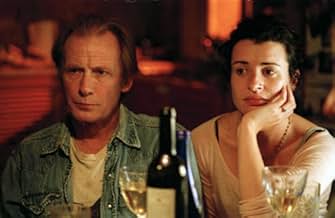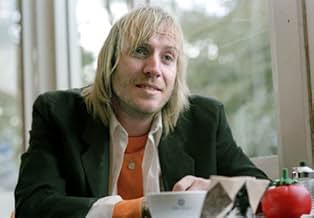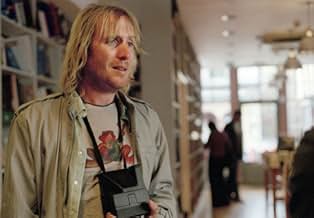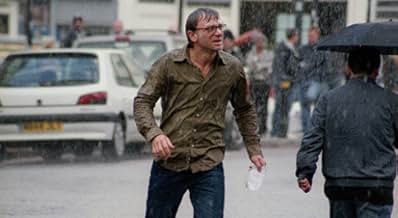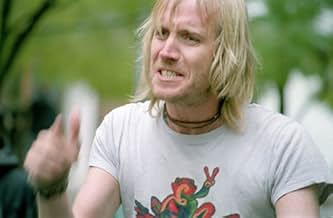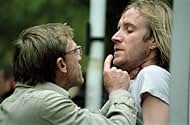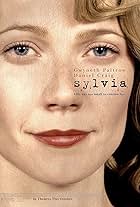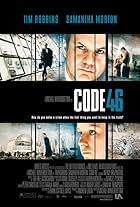Two strangers become connected by a tragedy, yet one dangerously feels that the connection goes much deeper than the other is willing to admit.Two strangers become connected by a tragedy, yet one dangerously feels that the connection goes much deeper than the other is willing to admit.Two strangers become connected by a tragedy, yet one dangerously feels that the connection goes much deeper than the other is willing to admit.
- Awards
- 4 wins & 12 nominations
Jeremy McCurdie
- Boy in Balloon
- (as Jeremy Mccurdie)
Rosie Michell
- Katie Logan
- (as Rosanna Michell)
- Director
- Writers
- All cast & crew
- Production, box office & more at IMDbPro
Storyline
Did you know
- TriviaJed (Rhys Ifans) can be seen in the background of many scenes, most notably the art gallery, where he exits to the right promptly.
- ConnectionsFeatured in Siskel & Ebert: The Incredibles/Birth/Saw/Enduring Love (2004)
- SoundtracksGod Only Knows
Written by Brian Wilson & Tony Asher
Published by Rondor Music London Ltd on behalf of Sea of Tunes Pub. Co.
Featured review
(since antirealist already beat me to the first...)
Oddly, I happen to be the person who asked Michell why he chose to use a hand-held camera on Saturday, and his initial response ("Why not?") was a bit flippant, but at the same time, I'm guessing the filmmakers weren't intending to give anything other than glib answers to the puffball questions they were expecting. (When asked if they felt the film perpetuated the negative stereotype of the mentally ill being violent, director Michell dismissed the allegation out of hand before Rhys Ifans stepped in with a quick-hit one-liner about being "completely sane, but I'm feeling a bit violent about that question." That should do it for intelligent discourse at THIS Q&A, thank you...)
The camera-work is a bit distracting, not necessarily because it's hand-held but because the reason for it -- which Michell did say was to represent a first person POV -- is so obvious. In particular, there are a few scenes in which the camera sneaks around behind walls and windows to catch a better view of the characters that screams "you're being watched," which generally sums up my main concern about the film: it telegraphs almost everything.
For a psychological thriller, it isn't nearly as taut or unpredictable as it needs to be. It also lags notably between plot points, content to bleed off any steam it may have picked up from a previous scene. Part of this problem could be caused by the trailer's reliance on exposing nearly every twist in the film, and part of it could be on the film's overuse of "thriller music" that, in the cut I saw, nearly overpowered all five senses every time it appeared in the mix.
However, the acting is generally impressive, yet understated. Daniel Craig does a wonderful job at portraying the complexities of a rational man who comes unhinged in the aftermath of a bizarre accident and the resultant stalker he's burdened with. And there was at least one twist that made me jump, so all is not lost on the tension front.
Last thought: I was stunned by the film's equation of homosexuality, theology and mental illness. I'm not sure what exact conclusion it (or the book) is trying to come to, but I'm guessing the post-screening Q&A wasn't the place to bring it up...
Oddly, I happen to be the person who asked Michell why he chose to use a hand-held camera on Saturday, and his initial response ("Why not?") was a bit flippant, but at the same time, I'm guessing the filmmakers weren't intending to give anything other than glib answers to the puffball questions they were expecting. (When asked if they felt the film perpetuated the negative stereotype of the mentally ill being violent, director Michell dismissed the allegation out of hand before Rhys Ifans stepped in with a quick-hit one-liner about being "completely sane, but I'm feeling a bit violent about that question." That should do it for intelligent discourse at THIS Q&A, thank you...)
The camera-work is a bit distracting, not necessarily because it's hand-held but because the reason for it -- which Michell did say was to represent a first person POV -- is so obvious. In particular, there are a few scenes in which the camera sneaks around behind walls and windows to catch a better view of the characters that screams "you're being watched," which generally sums up my main concern about the film: it telegraphs almost everything.
For a psychological thriller, it isn't nearly as taut or unpredictable as it needs to be. It also lags notably between plot points, content to bleed off any steam it may have picked up from a previous scene. Part of this problem could be caused by the trailer's reliance on exposing nearly every twist in the film, and part of it could be on the film's overuse of "thriller music" that, in the cut I saw, nearly overpowered all five senses every time it appeared in the mix.
However, the acting is generally impressive, yet understated. Daniel Craig does a wonderful job at portraying the complexities of a rational man who comes unhinged in the aftermath of a bizarre accident and the resultant stalker he's burdened with. And there was at least one twist that made me jump, so all is not lost on the tension front.
Last thought: I was stunned by the film's equation of homosexuality, theology and mental illness. I'm not sure what exact conclusion it (or the book) is trying to come to, but I'm guessing the post-screening Q&A wasn't the place to bring it up...
- jkownacki-1
- Sep 12, 2004
- Permalink
- How long is Enduring Love?Powered by Alexa
Details
- Release date
- Countries of origin
- Language
- Also known as
- Вічне кохання
- Filming locations
- Production companies
- See more company credits at IMDbPro
Box office
- Gross US & Canada
- $358,362
- Opening weekend US & Canada
- $34,610
- Oct 31, 2004
- Gross worldwide
- $1,875,649
- Runtime1 hour 40 minutes
- Color
- Sound mix
- Aspect ratio
- 2.35 : 1
Contribute to this page
Suggest an edit or add missing content



